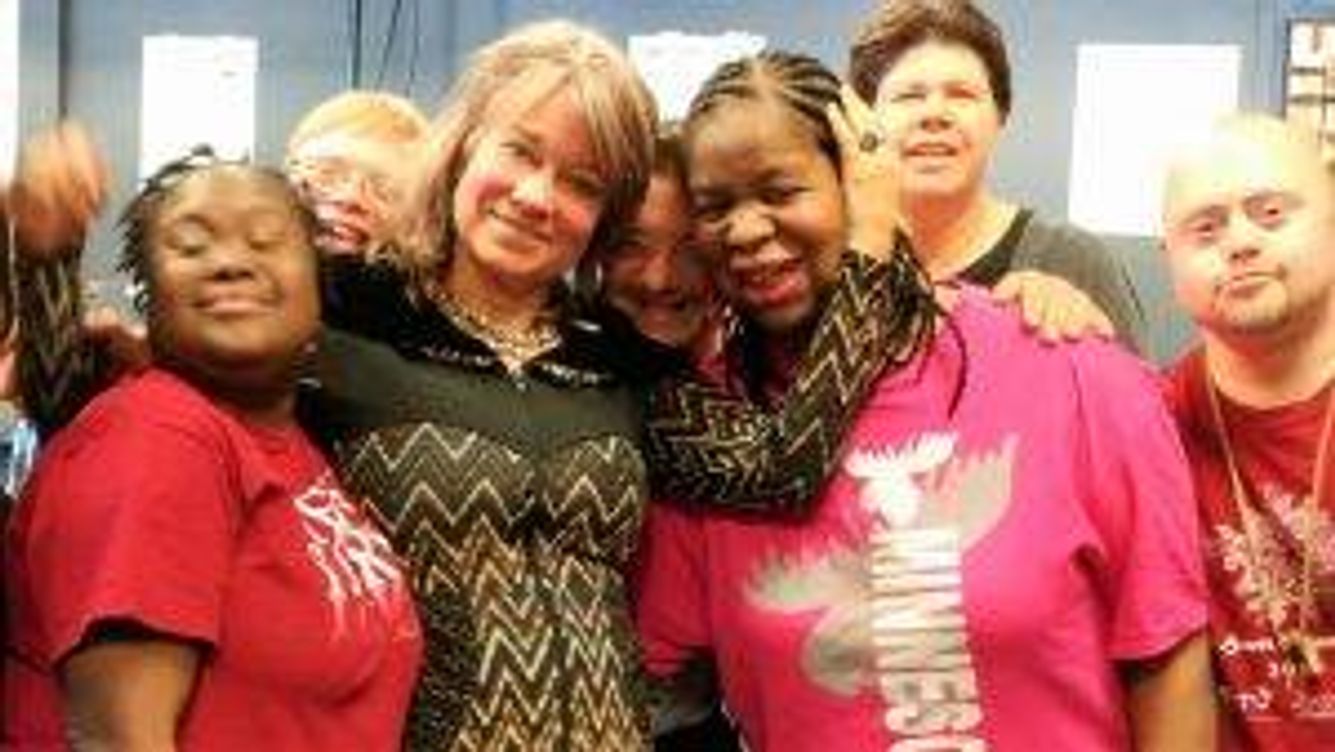A Place Where Artists With Disabilities Thrive
Interact, an intergenerational arts center, practices 'radical inclusion'
"Radical inclusion" isn’t a term that originated with Jeanne Calvit. But when she heard it at a theater conference in 2008, she knew right away that phrase described the mission of Interact Center in St. Paul, Minn., the only full-time professional visual and performing arts organization for artists with disabilities in the United States that she founded in 1996.

Interact operates with “radical inclusion” in mind, combining artists and performers of all kinds in one studio.
Calvit, who also serves as Interact's artistic director, knows that the people society underestimates the most are the ones who have the power to show us the best of humanity.
“We go beyond just one type of inclusion [at Interact],” she says. “We’re culturally, ability, generationally and racially inclusive.”
'My Goal is to Freely Embrace My Disability'
Over a hundred artists use the space to design their own creations and perform in ways that challenge outdated and ignorant ways of thinking. Interact’s current roster spans from ages 22 to 95, with a variety of disabilities represented on the team. Hundreds more are on a waiting list, wanting the intersectional mentorship and camaraderie so many have enjoyed.
One of those members is Jeffrey Haas, who has been with Interact since 2009 and is the resident Shakespeare expert. “My social worker at the time told me about [Interact],” he said, “I’ve been acting since I was nine years old, acting and even directing many shows. It wasn’t until later on in life that I developed stage fright.”
"Sometimes I wish I didn't have my disability, but [Interact] stimulates me to do my best at all times and makes a place for me."
Haas’ stage fright is a manifestation of Generalized Anxiety Disorder (GAD), characterized by extreme worry that can interfere with daily life. Part of Haas’ experiences include feeling like he is stuck in a loop of anxious thoughts, exacerbated when he feels that he cannot tell anyone about his anxiety. But like all of Interact’s members, Haas found a sense of belonging, safety and acceptance.
“My goal is to freely embrace my disability and demonstrate to an audience I am able to freely perform without the repercussions of being told I have a disability and can’t do it," he says. "Sometimes I wish I didn't have my disability. But [Interact] stimulates me to do my best at all times and makes a place for me.”
Haas had a significant role in the 2019 production of Hot Dog Daze, a show and overall artistic theme of the same name that was a personal favorite of program members. The show parodied Jerry Lewis’ Labor Day Muscular Dystrophy Telethon, infamous throughout the disability community for its rampant ableism and inhumane view of the disabled. The Interact actors turned the controversial telethon into a hilarious remix.
“In the show, you have the Jerry Lewis character announce a 'special guest,' but the special guest doesn’t show up. So they ask the cameraman (me) to go on instead. I performed a song called ‘Stage Fright’ which is my signature song since I have stage fright. My real stage fright helped make the song work so well with the show," Haas explains.
#ArtWorkingFromHome
The visual arts also play with the same themes as the performing arts. Many of the creations made by the artists become an instant hit among guests attending shows and galleries.
“One of our artists created a hot dog blanket similar to a Snuggie,” said Calvit. “Another made earrings in the shape of hot dogs.”
Support for Interact not only comes from local and national grants and funding from the Minnesota Department of Human Services (DHS), but from a percentage of sales made from premade creative works and commissions designed by the artists themselves.
“We were lucky to receive a $500,000 grant from the Minnesota DHS to start an e-commerce store and to add a remote archivist and gallery person to maintain it and other parts of the website. But it’s still in its infancy,” said Calvit. “Unfortunately, a lot of it slowed down once the coronavirus hit.”
Because of quarantine orders, Interact can no longer host its members in person, making a lot of the funding the organized used to keep the program going unavailable until quarantine is lifted. For now, it must rely on donations.
Staff and community members have adapted by shifting their programs online, shipping their artists supplies to use at home and keeping creativity alive with their official Facebook page and sharing it on all of their social media, including Interact's YouTube channel. Artists send pictures, do skits and show their creativity over the web like they would in the studio using the hashtag #ArtWorkingFromHome.
"We're all here to give things to humanity. Our artists have given that a thousandfold."
“People on Facebook have been sharing poetry and songs and it buries itself into the soul,” said Calvit. “We’re all here to give things to humanity. Our artists have given that a thousandfold. They have given so much of themselves and have shown so much against adversity such as the near-death experiences [some have faced]."
Haas is using his time at home to host a class on Shakespearean monologues through Facebook video chat. “I’m very excited about it, because the speeches talk about a silver lining during adversity," he says. "We can find good in everything despite the storm brewing above. I’m nervous, but like I’ve learned with improv, it’s all about plunging into the abyss happily and knowing that somehow it will come together.”
Challenging Ageist and Ableist Assumptions
Interact is also taking this time to continue to challenge the ageist and ableist assumptions that people in older populations and the disabled are lesser than those who are not, lately coming into play when discussing who is most worthy of medical treatment during a pandemic.
“Most of our [government] leaders are over sixty years old. How could someone think a life no longer has value once you hit a certain age?” challenged Calvit. “One of our artists came to us when she was eighty-two and later went on tour with her art in her late eighties. She lived to be a hundred and one.”

Interact’s members find great value in having artists of all ages around the studio, even though age is rarely mentioned in the first place.
“The subject of age never comes up, unless to swap stories,” said one artist who simply goes by Emmanuel. “Otherwise, it only comes up when it’s something to celebrate.”
Brita Light, one of Interact’s staff members, observes the impact of this daily. “It really shapes the art that is made being in such an eclectic mix of people,” she said. “I think there's also a lot of learning that is fostered intergenerationally through older artists sharing their experiences, whether it be racially through orientation or sexual identity or even dealing with a disability in a climate that was very different for them growing up. The younger artists also play an integral role in introducing some of the technological aspects of art to [the older residents].”
The core values of Interact that allow their artists to thrive are hope, creativity and human potential. If you ask Calvit, it’s enough to save lives.
“Seeing people some consider 'less than' create works of art about their inner feelings that reach into your soul. When people see [Interact’s] performances, they are filled with tears and joy. It gives everybody hope,” says Calvit.

